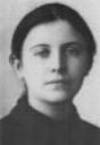i respectfully refused when asked by parishioners next to me (mind you i went to sit alone to avoid being put into this predicament but latecomers found their way to the pew i was sitting in)
i mentioned to a friend of mine (one who extended her hand -right side) that i would "explain later".....she replied "you dont have to, if you're not doing it then you have a valid reason" phewww....but nevertheless i had to explain
after Mass i explained that its not in the rubrics and we cannot just introduce liturgical postures ourselves......i reiterated fr macnamara (regina apostolorum - rome) response to many whom have written there asking for clarification about this new practise.
There is no bishop documentation (archdiocese of melbourne) that i know of that allows this let alone any 'go ahead' from the Holy See.
sourceIt is true that there is no prescribed posture for the hands during the Our Father and that, so far at least, neither the Holy See nor the U.S. bishops' conference has officially addressed it.
The argument from silence is not very strong, however, because while there is no particular difficulty in a couple, family or a small group spontaneously holding hands during the Our Father, a problem arises when the entire assembly is expected or obliged to do so.
The process for introducing any new rite or gesture into the liturgy in a stable or even binding manner is already contemplated in liturgical law. This process entails a two-thirds majority vote in the bishops' conference and the go-ahead from the Holy See before any change may take effect.
Thus, if neither the bishops' conference nor the Holy See has seen fit to prescribe any posture for the recitation of the Our Father, it hardly behooves any lesser authority to impose a novel gesture not required by liturgical law and expect the faithful to follow their decrees.
While there are no directions as to the posture of the faithful, the rubrics clearly direct the priest and any concelebrants to pray the Our Father with hands extended -- so they at least should not hold hands.
One could argue that holding hands expresses the family union of the Church. But our singing or reciting the prayer in unison already expresses this element.
The act of holding hands usually emphasizes group or personal unity from the human or physical point of view and is thus more typical of the spontaneity of small groups. Hence it does not always transfer well into the context of larger gatherings where some people feel uncomfortable and a bit imposed upon when doing so.
The use of this practice during the Our Father could detract and distract from the prayer's God-directed sense of adoration and petition, as explained in Nos. 2777-2865 of the Catechism of the Catholic Church, in favor of a more horizontal and merely human meaning.
For all of these reasons, no one should have any qualms about not participating in this gesture if disinclined to do so. They will be simply following the universal customs of the Church, and should not be accused of being a cause of disharmony.
marie


